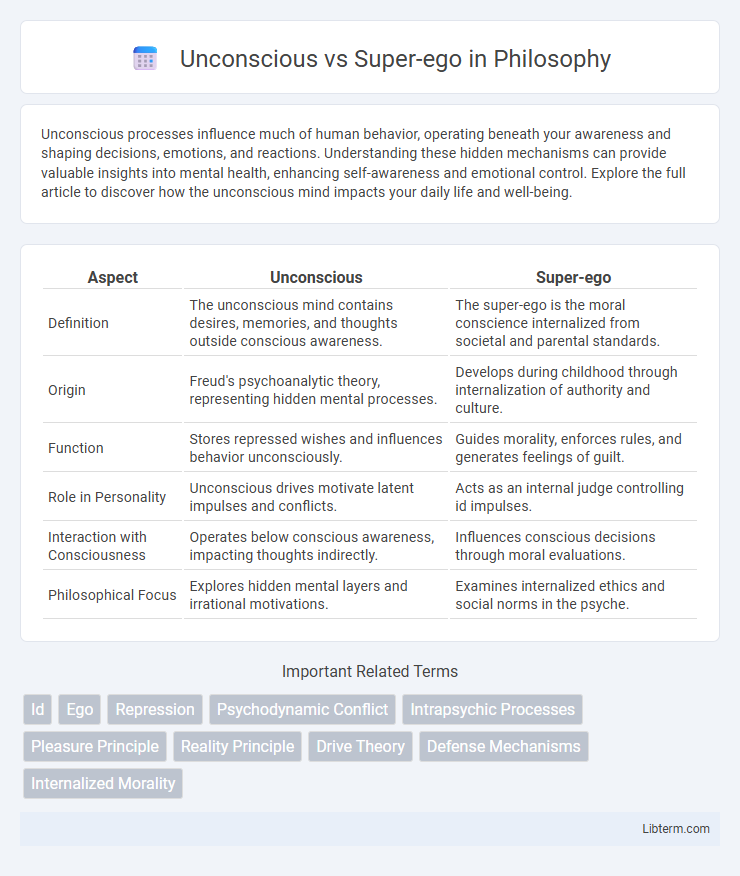Unconscious processes influence much of human behavior, operating beneath your awareness and shaping decisions, emotions, and reactions. Understanding these hidden mechanisms can provide valuable insights into mental health, enhancing self-awareness and emotional control. Explore the full article to discover how the unconscious mind impacts your daily life and well-being.
Table of Comparison
| Aspect | Unconscious | Super-ego |
|---|---|---|
| Definition | The unconscious mind contains desires, memories, and thoughts outside conscious awareness. | The super-ego is the moral conscience internalized from societal and parental standards. |
| Origin | Freud's psychoanalytic theory, representing hidden mental processes. | Develops during childhood through internalization of authority and culture. |
| Function | Stores repressed wishes and influences behavior unconsciously. | Guides morality, enforces rules, and generates feelings of guilt. |
| Role in Personality | Unconscious drives motivate latent impulses and conflicts. | Acts as an internal judge controlling id impulses. |
| Interaction with Consciousness | Operates below conscious awareness, impacting thoughts indirectly. | Influences conscious decisions through moral evaluations. |
| Philosophical Focus | Explores hidden mental layers and irrational motivations. | Examines internalized ethics and social norms in the psyche. |
Understanding the Unconscious: A Psychoanalytic Overview
The unconscious mind, a central concept in psychoanalysis, houses hidden desires, fears, and memories that influence behavior without conscious awareness. The super-ego functions as the internalized moral authority, rooted in societal and parental standards, often clashing with unconscious impulses. Understanding the dynamic tension between the unconscious and super-ego reveals insights into human motivation, psychological conflict, and the formation of personality.
Defining the Super-ego: Freud’s Moral Regulator
The super-ego acts as Freud's moral regulator, embodying internalized societal norms and ethical standards shaped during early childhood. It operates unconsciously, guiding behavior through feelings of guilt and pride by enforcing adherence to these ideals. Contrasting with the unconscious id's primal desires, the super-ego strives for perfection and moral judgment within the psyche.
Origins and Development of the Unconscious
The unconscious, rooted in Sigmund Freud's psychoanalytic theory, originates from repressed desires and memories outside conscious awareness, forming during early childhood through interactions with primary caregivers and environmental influences. The super-ego develops later, encompassing internalized societal norms and moral standards, acting as a regulatory force shaped by parental guidance and cultural expectations. Together, these structures influence behavior by mediating primal impulses from the unconscious and ethical demands imposed by the super-ego.
Formation and Role of the Super-ego
The super-ego forms through internalization of parental and societal values during early childhood, shaping moral standards and conscience. It functions as an ethical guide, imposing guilt and striving to control the impulses of the unconscious id. This dynamic balance aids in self-regulation and influences behavior aligned with societal norms.
Key Differences: Unconscious Mind vs Super-ego
The unconscious mind encompasses all thoughts, memories, and desires outside of conscious awareness, influencing behavior indirectly, while the super-ego serves as the internalized moral standard guiding judgment and self-control. The unconscious mind contains repressed drives and instincts, impacting emotions and actions without conscious recognition, whereas the super-ego functions as a critical, evaluative system enforcing societal rules and ideals. Unlike the broader and more passive unconscious, the super-ego actively imposes ethical constraints and fosters feelings of guilt or pride based on adherence to internalized norms.
How the Unconscious Influences Human Behavior
The unconscious mind drives human behavior through repressed desires, memories, and instincts that shape thoughts and actions without conscious awareness. It influences decision-making, emotional responses, and habitual patterns by activating hidden motives and unresolved conflicts stored beneath the surface. The super-ego, as the moral conscience, counterbalances these impulses by imposing societal rules and ethical standards, often creating internal tension between instinctual drives and moral judgments.
Super-ego’s Impact on Morality and Guilt
The super-ego serves as the internalized moral compass, enforcing societal rules and ethical standards that shape an individual's sense of right and wrong. Unlike the unconscious, which harbors repressed desires and instincts, the super-ego actively generates feelings of guilt and shame when behavior conflicts with moral expectations. Its influence is crucial in regulating impulses, guiding ethical behavior, and sustaining social conformity by promoting self-discipline and accountability.
Conflicts Between Unconscious Desires and Super-ego Demands
Conflicts between unconscious desires and super-ego demands arise when primal impulses clash with internalized moral standards, creating psychological tension. The unconscious harbors instinctual drives such as aggression and sexuality, while the super-ego enforces societal rules and ideals learned from parents and culture. This internal struggle often manifests in feelings of guilt, anxiety, and repression, influencing behavior and mental health outcomes.
Therapeutic Approaches to Accessing the Unconscious and Super-ego
Therapeutic approaches to accessing the unconscious often involve psychoanalysis, where techniques like free association and dream interpretation reveal hidden desires and conflicts beneath conscious awareness. In contrast, accessing the super-ego focuses on exploring internalized moral standards through cognitive-behavioral therapy and guided self-reflection to address guilt and self-criticism. Integrating these methods enhances insight into unconscious motivations and ethical self-regulation, facilitating psychological healing and behavior change.
Modern Perspectives: Evolving Views on the Unconscious and Super-ego
Modern perspectives on the unconscious emphasize dynamic processes beyond Freud's original model, integrating cognitive neuroscience insights to reveal how unconscious mechanisms influence decision-making and behavior. The super-ego is now often viewed through a socio-cultural lens, reflecting internalized societal norms and moral development shaped by ongoing social interactions. Contemporary theories highlight fluidity and interaction between unconscious desires and super-ego constraints, underscoring adaptive psychological functions rather than rigid structures.
Unconscious Infographic

 libterm.com
libterm.com